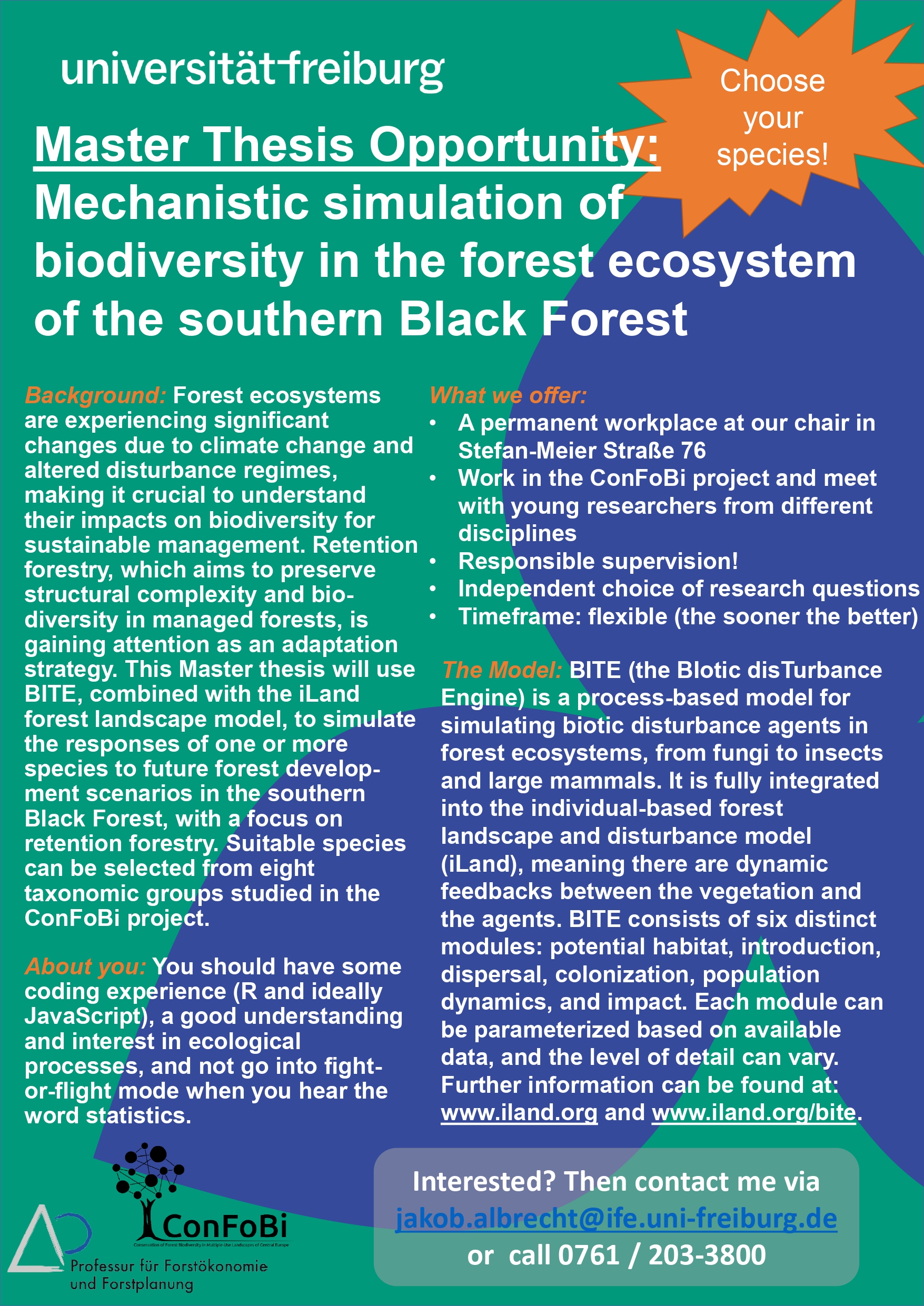Open Positions
MSc Thesis: Mechanistic simulation of biodiversity in the forest ecosystem of the southern Black Forest

Masters-Thesis: Exploring the Dark Diversity of the Black Forest
Biodiversity in the Black Forest
The biological diversity of forest ecosystems is highly dependent on natural processes that generate their structural complexity and dynamics. These processes and subsequently structure and biodiversity are usually reduced by forestry. Therefore, retention measures such as maintaining deadwood and habitat trees, are increasingly applied for the conservation of biodiversity in managed forests, including the Black Forest. It is unclear, however, how many of the original old-growth forest-dependent species of the Black Forest survived centuries of multiple use. Some may have been lost, a few may have re-colonized, others may still be present, but very rare. For example, the extinction of the three-toed woodpecker towards the end of the 19th century is explained by a large-scale lack of dead wood due to intensive forest use.
The major hypothesis of ConFoBi is that structural richness of our forests is correlated with biodiversity measures, such as the occurrence, abundance and diversity of various taxa: the more complex is the forest structure, the more species it will sustain. So far, however, we found only little support for this hypothesis in our study system. One explanation might be that species dependent on naturally dynamic forests including old-growth specialists may be too rare on our study plots to find statistical support for our hypothesis, although they still occur in the Black Forest. The Master Thesis: Estimating Dark Diversity Dark Diversity is defined as the absent or undetected proportion of species from a habitat-specific species-pool (Pärtel et al. 2011). The central question for this MSc thesis is: how can this dark diversity be estimated in the Black Forest? The major approach to estimate dark diversity is relating the locally recorded species pool to a (recent or historic) reference species pool for the region. Various techniques are available, ranging from direct comparisons of recorded and reference species lists, to modelling approaches (such as co-occurrence analysis to circumvent reconstruction of reference species pools). The task of this Master’s thesis will be to review existing methods for estimating dark diversity, and assess their suitability for the Black Forest, depending on data availability. The ConFoBi datasets of birds and vascular plants are available as test cases for assessing dark diversity. In addition, the question of the effects of forest structure on dark diversity may be addressed. We expect the MSc student to further develop and finalize the study question in cooperation with her/his supervisors.
Whom we are looking for
For this Master’s thesis we are looking for a student who:
- is a conceptual thinker and enjoys theoretical work,
- is familiar with the concept of biodiversity and related concepts (e.g. extinction debt, colonization credit, dispersal, community assembly) and methods
- has a good understanding of the ecology and use of forests in central Europe,
- has a good ecological and taxonomical understanding of vascular plants and/or birds in the Black Forest,
- brings a solid basis in ecological modelling techniques and other analyses in R,
- is fluent in spoken and written English; knowledge of German is an advantage.
- Candidates must have a BSc degree in environmental sciences, forest sciences, ecology, conservation biology or related disciplines. We consider candidates enrolled in MSc programmes of Freiburg University (Faculty of Environment and Natural Resources; Faculty of Biology), however, also external students from other Universities in Germany or abroad are welcome to apply. This project does not require field work and can be started any time. Suggested start date: 1 June 2021; earlier or later start possible. Office space available at ConFoBi (Herder Building). Supervision: various ConFoBi scientists; to be clarified.
Interested? For further information and application email:
Ilse Storch (llse.storch@wildlife.uni-freiburg.de) Professor of Wildlife Ecology and Management Faculty of Environment and Natural Resources, University of Freiburg D-79085 Freiburg, Germany
http://www.wildlife.uni-freiburg.de https://confobi.uni-freiburg.de
ConFoBi, 28 April 2021
Key references:
Lewis, R.J., Szava-Kovats, R., Pärtel, M. 2016. Estimating dark diversity and species pools: an empirical assessment of two methods. Methods in Ecology and Evolution 7, 104-113. Pärtel, M., Szava-Kovats, R., Zobel, M., 2011. Dark diversity: shedding light on absent species. Trends in Ecology & Evolution 26, 124-128. Storch I., et al. 2020. Evaluating the effectiveness of retention forestry to enhance biodiversity in production forests of Central Europe using an interdisciplinary, multi-scale approach. Ecology and Evolution, 10:1489–1509. Zobel, M. 2016. The species pool concept as a framework for studying patterns of plant diversity. Journal of Vegetation Science 27, 8-18.


